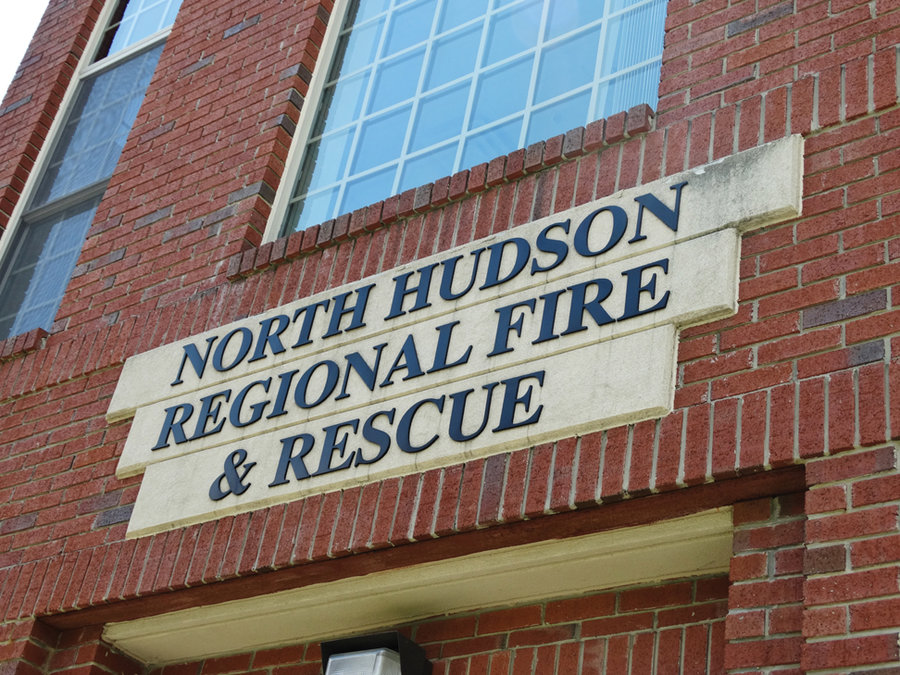The community just got a little safer. Twelve new firefighters were sworn in to the North Hudson Regional Fire Department – which serves North Bergen, Weehawken, Union City, West New York, and Guttenberg — on June 23.
All 12 are military veterans, having served in Iraq and Afghanistan. The new hires were funded by a $5.6 million federal SAFER (Staffing for Adequate Fire and Emergency Response) grant.
In the past two years, the NHRFR has hired 55 new firefighters—all of them veterans.
“We’ve made a concerted effort to try and do our share for the returning veterans, for which this country owes a great debt of gratitude,” said Weehawken Mayor and Regional Board Chairman Richard Turner, one of numerous municipal officials at the swearing-in ceremony.
“I thank you for your service,” Montagne told the new firefighters, “but your service has just started. Just as you served honorably in the military, you must do the same at North Hudson Regional. The citizen community depends on you.”
Department Chief Frank Montagne said the new firefighters could be placed in any of the 15 firehouses throughout the five towns.
Regionalization in 1999
NHRFR was created in 1999, establishing a single entity rather than five separate groups serving individual towns. At the time there were more than 15 firehouses throughout the region.
“Over time they selectively closed firehouses,” explained Montagne. “In North Bergen and West New York we had houses literally two blocks apart. So it’s efficiency. It’s also related to response time–the quickest response time to serve a certain point. You had to analyze that over time. We’re now where we want to be.”
“In Guttenberg, we don’t have a company in town,” said Guttenberg Mayor Gerald Drasheff, “but they’re on the four corners of town. As long as they get there within the time that we need them, that was the whole point of it. There was a lot of duplication, a lot of overlap.”
North Hudson Regional Fire and Rescue has hired 55 new firefighters in the past two years—all of them veterans.
____________
The reason was that Guttenberg had a volunteer fire department at the time. Not only was that financially beneficial, but as Drasheff pointed out, “Those people were committed to their volunteering. It was tough to tell them we don’t need them anymore.”
Initially the volunteer and regional departments coexisted side by side, but it was blatantly inefficient.
“I think we probably joined in 2000, 2001,” said Drasheff. “We were a little late to the dance. But we’re fully part of it now.”
Filling the gap
The number of firefighters declined sharply when the NHRFR was established. “I don’t think we’ll ever be back to when we combined,” said North Bergen Township Administrator Chris Pianese, a board member of the NHRFR. “Because at that point 50 guys retired over two years as part of regionalization. We knew that was going to happen.”
More recently another large group of firefighters retired, for a different reason: Gov. Christie’s pension reform. “Rather than pay increased pension costs they just decided to go,” said Pianese. “That was the second wave of like 40 guys in one year.”
The recent hiring of 55 veterans to fill the gaps was made possible by the $5.6 million grant, but it came with conditions.
“Under that grant, they pay their salaries and benefits for three years,” explained Drasheff. “But part of the agreement is that after the grant runs out, you can’t all of a sudden reduce your force. You have to maintain a certain level. And that’s part of why we’re doing this—to maintain the level to which we have a commitment for that grant.”
“We received the SAFER grant to hire 32 people a year and a half ago,” explained Montagne. “I think there’s 265 [firefighters] currently. I think our level was 270 when we got the grant and we had to maintain that level. We want to be at this level anyway. But right now we’re hiring another 12 in the fall to maintain our level.”
Although the grant has no restrictions on who is hired, the Civil Service Commission in Trenton does. They administer the firefighter test and oversee the results. “The veterans who serve overseas, military action, get preference,” said Montagne. “No matter what their score is, they go to the top of the list. And then once all the military is exhausted, then you go to the average citizen on the list, even though the average citizen might have a higher score than the top vet.”
“The next 12 hires will be all veterans,” he added. “We know that for a fact. The list goes very deep.”
Getting to work
Training new recruits takes six to eight weeks at the Bergen Fire Academy in Mahwah. The current group of 12 firefighters actually underwent training and began working long before they were sworn in.
“We did a reverse process because normally we swear them in, then they go to the academy. This we did the opposite because we had a time restriction,” said Montagne.
“We got hired on February 24,” said Terence Smalley, one of the new firefighters. “May 9 was my first day working.”
And how does he feel now that it’s official? “It’s this weight lifted. Finally getting hired. Finally having something to be proud of. I wouldn’t want to do anything else.”
Smalley served in Iraq with the U.S. Marine Corps. His father, Robert Hicks, attended the swearing-in for support.
“I’m excited for him,” said Hicks. “This is something he wanted to do ever since he got out of the military. His dedication paid off.”
Also among the attendees at the ceremony were NHRFR Executive Directors Michael DeOrio and Jeffrey Welz, and Board Members Martin Martinetti and Ruben Vargas.
Art Schwartz may be reached at arts@hudsonreporter.com.
